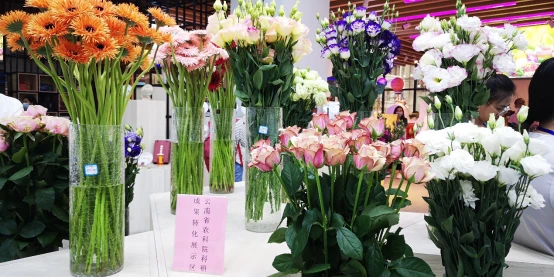
-
[新华网]云南大力支持生物医药产业创新发展 培育壮大经营主体 最高奖2000万元
2024-01-25
-
[科技日报]新策略提升钙钛矿太阳能电池性能
2024-01-25
-
[科技日报]全程机械化 云南耿马甘蔗产业提质增效
2024-01-25
-
[科技日报]科技创新赋能云南“三大经济”建设
2024-01-25
-
[科技日报]电解水制氢将有高稳定性析氧催化剂
2024-01-25
来源:科技日报
By ZHAO Hanbin,ZHANG Mengran and GAO Xingjian
With a variety of landforms, rivers and climates, Yunnan province hosts a unique ecology and enviable plant kingdom. Much faith has therefore been placed in its eco-agriculture .

Innovation in science and technology has provided support for the development of plateau characteristic agricultural industry in Yunnan.The picture shows some slices of new flower variety, which is developed by Academy of Agricultural Sciences of Yunnan Province. (PHOTO: ZHAO Hanbin)
Since China's 13th Five-Year Plan was put forward, Yunnan had made great strides in international cooperation in science and technology and strongly supported the development of industrial innovation through establishing mechanisms, building platforms, bringing in technology, and promoting communication. With its eyes on a new stage of development, the 14th Five-Year Plan sees Yunnan boldly implementing a more open and inclusive strategy for international cooperation in science and technology, which provides mutual benefits, advancing international cooperation with more open-minded attitudes and measures, actively integrating in the global innovation network and enhancing its own ability of innovation in science and technology with extensive cooperation.
International support platform helps revitalize the mango industry
As one of the key industries in Yunnan, the mango industry had faced a dilemma after the triennial mangos grown in the province were found to have too much fiber, making them virtually inedible. In addition , they were not storable or transportable, which obviously affected markets outside Yunnan.
In 2010, the Yunnan local government carried out its first international cooperation program called Introduction and Demonstration of Tropical Fruits in the Greater Mekong Subregion. More than 100 foreign specialists were successively brought in through these platforms, including science and technology, communication and cooperation groups in the Greater Mekong subregion and China-South Asia communication and cooperation groups for agricultural science and technology. In addition, five Chinese experts were sent for long-term technological exchange, and more than 50 short-term scientific research exchange programs were carried out.
Over the past decade Yunnan has widely introduced varieties of mangos from major producing areas including Thailand, Vietnam and Myanmar, and various domestic mango producing areas. More than 650 samples of domestic and foreign mango varieties were systematically collected and preserved to build breeding platforms. Also, 16 varieties adaptable to different ecological conditions in Yunnan were selected for massive production. The overall arrangement for the cultivation of mangos in different ecological areas along the Honghe River, Nujiang River and Jinsha River were carried out setting out the province's cultivation area.
Thanks to international cooperation, Yunnan has now constructed a technological support system to assist its mango industry, using the integration of core technology and industrialization of achievements made by introducing foreign experts.
Salmon-breeding technology from Chile helps grow the local market
It is a little known fact that at one time China had very little experience in the field of salmon farming and breeding. Accompanied by its economic resurgence, China has seen an ongoing growth in consumption of high-end aquatic products and market requirement, of which 90 percent are dependent on imports.
Yunnan Binkunzhongzhi Ltd cooperated with the world-famous aquatic engineer, Professor Juan Carlos, a salmon expert from the University of Rosragos in Chile. After a 13-year dedicated expedition and selection of cold-water resources in Shaanxi province, Guangdong province, Lijiang and Tengchong in Yunnan province, Carlos and his team finally chose Houqiao Town, Danzha Village in the Great Chahe basin area in Tengchong as the breeding base for salmon.
After the project landed in Tengchong, the world's most advanced industrialized ecological aquaculture facilities were brought in. Now, the project's first-stage construction of a superior breeding base has been completed and put into use. Since its production started on November 15, 2018, the hatching rate has reached 99.6 percent, and the large-sized salmon fry, weighing 150g and 200g, have been sold to every province in China and Southeast Asian countries.
In October 2019, Carlos was awarded an honorary title "Yunnan Friendship Awards" for foreign experts by the government of Yunnan province.
Perennial rice benefits China's neighbors
In 2017, a team working on perennial rice research at Yunnan University invited seven experts from America, Australia, Laos and Thailand to Yunnan, to jointly develop and promote a new green production pattern for perennial plants, including cultivation of new varieties of perennial rice, compatibility testing for perennial rice, supporting technology development, as well as demonstration and popularization of planting technology.
Hu Fengyi and his team, from the College of Agriculture, Yunnan University, have been cooperating with experts from various countries to conduct research, experiments and demonstrations of perennial rice. After his results were adopted for massive application in 2021, the planting area has now surpassed 500 Mu, and the plants are thriving.
According to the expert group's assessment, the demonstration area for perennial rice variety, Yunda 107, has yielded 615.6 kg per Mu, 7.77 percent higher than the adjacent non-demonstration area, showing an obvious increase in production and harvest, and a promising future for application.
This international cooperation has promoted the popularization of production technology of perennial rice in South Asia and Southeast Asia, to the benefit of countries in those regions.
Source: Yunnan Provincial Science and Technology Department